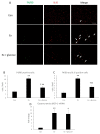Glucose Ingestion Inhibits Endurance Exercise-Induced IL-6 Producing Macrophage Infiltration in Mice Muscle
- PMID: 31262006
- PMCID: PMC6682949
- DOI: 10.3390/nu11071496
Glucose Ingestion Inhibits Endurance Exercise-Induced IL-6 Producing Macrophage Infiltration in Mice Muscle
Abstract
Background: Carbohydrate (CHO) supplementation during exercise attenuates exercise-induced increases in plasma Interleukin (IL)-6 concentration. However, the effects of CHO supplementation on muscle IL-6 production during endurance exercise is controversial. The purpose of this study was to investigate the effects of CHO supplementation on muscle IL-6 production during endurance exercise with a special focus on the IL-6 producing cells.
Methods: C57BL/6J mice were divided into three groups-sedentary with water ingestion group as the control (Con; n = 10), exercise with water ingestion group (Ex; n = 10), and exercise with 6% glucose ingestion group (Ex + glucose; n = 10). The Ex and Ex + glucose groups completed 3 h of treadmill running (24 m/min, 7% incline) and were sacrificed immediately after exercise.
Results: The exercise-induced increases of plasma IL-6 concentration and gastrocnemius IL-6 gene expression were attenuated by glucose ingestion. However, the increases of soleus IL-6 gene expression and gastrocnemius and soleus IL-6 protein expression were not attenuated by glucose ingestion. Furthermore, we observed that macrophages that infiltrated muscle produce IL-6 and glucose ingestion attenuated the infiltration of IL-6-producing macrophages.
Conclusion: This study revealed that infiltrating macrophages may be one type of IL-6-producing cells during endurance exercise, and the infiltration of these cells in muscle was attenuated by glucose ingestion. However, the effects of glucose ingestion on muscle IL-6 production were limited.
Keywords: endurance exercise; glucose ingestion; interleukin 6 (IL-6); macrophage; monocyte chemotactic protein (MCP)-1.
Conflict of interest statement
The authors declare no conflict of interest.
Figures




Similar articles
-
Metabolic Responses to Carbohydrate Ingestion during Exercise: Associations between Carbohydrate Dose and Endurance Performance.Nutrients. 2018 Jan 3;10(1):37. doi: 10.3390/nu10010037. Nutrients. 2018. PMID: 29301367 Free PMC article. Clinical Trial.
-
Carbohydrate ingestion attenuates the increase in plasma interleukin-6, but not skeletal muscle interleukin-6 mRNA, during exercise in humans.J Physiol. 2001 Jun 1;533(Pt 2):585-91. doi: 10.1111/j.1469-7793.2001.0585a.x. J Physiol. 2001. PMID: 11389214 Free PMC article. Clinical Trial.
-
Catechins suppress muscle inflammation and hasten performance recovery after exercise.Med Sci Sports Exerc. 2013 Sep;45(9):1694-702. doi: 10.1249/MSS.0b013e31828de99f. Med Sci Sports Exerc. 2013. PMID: 23470311
-
Human muscle glycogen metabolism during exercise. Effect of carbohydrate supplementation.Sports Med. 1998 Jan;25(1):7-23. doi: 10.2165/00007256-199825010-00002. Sports Med. 1998. PMID: 9458524 Review.
-
Recent advances in the role of interleukin-6 in health and disease.Curr Opin Pharmacol. 2020 Jun;52:47-51. doi: 10.1016/j.coph.2020.04.010. Epub 2020 Jun 18. Curr Opin Pharmacol. 2020. PMID: 32563931 Review.
Cited by
-
β-hydroxy-β-methylbutyrate supplementation benefits the effects of resistance training on body fat reduction via increased irisin expression in white adipose tissue.Biol Sport. 2021 Mar;38(1):113-121. doi: 10.5114/biolsport.2020.97671. Epub 2020 Aug 21. Biol Sport. 2021. PMID: 33795920 Free PMC article.
-
Characterization and Modulation of Systemic Inflammatory Response to Exhaustive Exercise in Relation to Oxidative Stress.Antioxidants (Basel). 2020 May 8;9(5):401. doi: 10.3390/antiox9050401. Antioxidants (Basel). 2020. PMID: 32397304 Free PMC article. Review.
-
Effects of Sulforaphane Treatment on Skeletal Muscle from Exhaustive Exercise-Induced Inflammation and Oxidative Stress Through the Nrf2/HO-1 Signaling Pathway.Antioxidants (Basel). 2025 Feb 12;14(2):210. doi: 10.3390/antiox14020210. Antioxidants (Basel). 2025. PMID: 40002396 Free PMC article.
-
The Effects of Beverage Intake after Exhaustive Exercise on Organ Damage, Inflammation and Oxidative Stress in Healthy Males.Antioxidants (Basel). 2021 May 28;10(6):866. doi: 10.3390/antiox10060866. Antioxidants (Basel). 2021. PMID: 34071378 Free PMC article.
-
An open-source, lockable mouse wheel for the accessible implementation of time- and distance-limited elective exercise.PLoS One. 2021 Dec 21;16(12):e0261618. doi: 10.1371/journal.pone.0261618. eCollection 2021. PLoS One. 2021. PMID: 34932607 Free PMC article.
References
-
- Suzuki K. Cytokine response to exercise and its modulation. Antioxidants. 2018;7:17. doi: 10.3390/antiox7010017. - DOI
-
- Suzuki K., Yamada M., Kurakake S., Okamura N., Yamaya K., Liu Q., Kudoh S., Kowatari K., Nakaji S., Sugawara K. Circulating cytokines and hormones with immunosuppressive but neutrophil-priming potentials rise after endurance exercise in humans. Eur. J. Appl. Physiol. 2000;81:281–287. doi: 10.1007/s004210050044. - DOI - PubMed
-
- Febbraio M.A., Steensberg A., Keller C., Starkie R.L., Nielsen H.B., Krustrup P., Ott P., Secher N.H., Pedersen B.K. Glucose ingestion attenuates interleukin-6 release from contracting skeletal muscle in humans. J. Physiol. (Lond.) 2003;549:607–612. doi: 10.1113/jphysiol.2003.042374. - DOI - PMC - PubMed
MeSH terms
Substances
LinkOut - more resources
Full Text Sources
Miscellaneous

